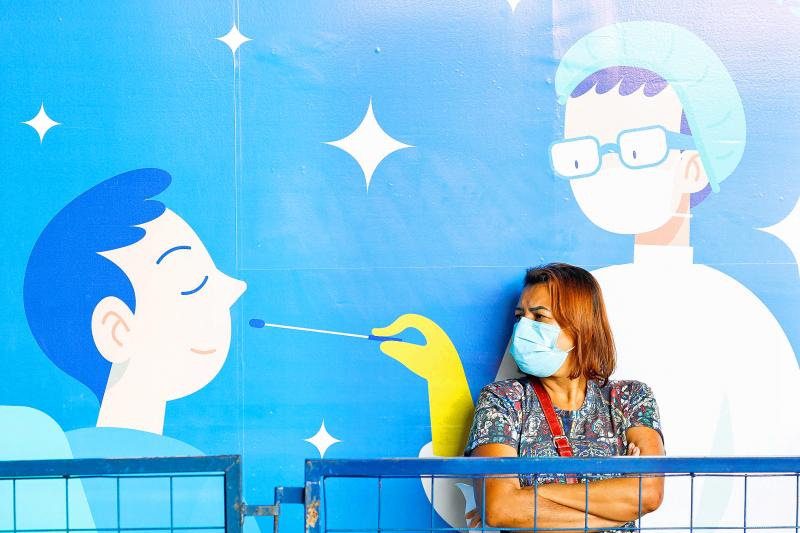The total number of COVID-19 cases registered worldwide on Friday passed 300 million, with the Omicron variant of SARS-CoV-2’s rapid spread setting new infection records in dozens of countries over the past week.
Thirty-four countries have in the past seven days recorded their highest number of weekly cases since the start of the COVID-19 pandemic, including 18 nations in Europe and seven in Africa, according to an Agence France-Presse count based on official figures.
While far more contagious than previous variants, Omicron appears to cause less severe illness than its predecessors.

Photo: AFP
Even as it spurred the world to a record 13.5 million cases in the past week alone — 64 percent higher than the previous seven days — the global average of deaths dropped 3 percent.
France’s public health authority on Friday said that the risk of hospitalization was about 70 percent lower for Omicron, citing data from Canada, Israel, the UK and the US.
However with a global average of 2 million new cases being detected daily, experts have said that that the sheer numbers threaten to overwhelm health systems.
WHO Director-General Tedros Adhanom Ghebreyesus said that Omicron should not be categorized as mild, as it “is hospitalizing people and it is killing people.”
“In fact, the tsunami of cases is so huge and quick, that it is overwhelming health systems around the world,” he said.
Omicron’s dizzying spread since being detected six weeks ago has prompted many nations to push harder for more vaccinations and some to clamp down with restrictions.
German Chancellor Olaf Scholz said that access to the country’s bars and restaurants would be limited to those who are fully vaccinated or have recovered from the virus and can also provide a negative test result.
However, people who have received a booster shot would be exempted from the test requirement.
In Austria, Chancellor Karl Nehammer tested positive for COVID-19.
“No cause for worry, I’m fine,” he said. “I continue to plead: Get vaccinated.”
As cases skyrocket in the US — which also broke its daily caseload record this week — US President Joe Biden said that COVID-19 “as we are dealing with it now is not here to stay ... but having COVID in the environment — here and in the world — is probably here to stay.”
In India, Omicron-led rising case numbers have brought fears of a return to the country’s darkest pandemic days last year, when thousands were dying of COVID-19 every day.
Gautam Menon, a professor of physics and biology at India’s Ashoka University who has worked on COVID-19 infection modeling, said that “this could potentially stress out healthcare systems to levels comparable to or worse than the second wave.”
However, Kolkata’s High Court rejected a bid to cancel a major Hindu festival, despite fears the virus could spread rapidly among the 500,000 expected attendees.
“People from all states in the country will attend the religious festival and take a holy dip,” environmentalist Subhash Dutta said. “They may carry variant viruses and this religious festival may end up being the biggest superspreader in the coming days.”

CHAOS: Iranians took to the streets playing celebratory music after reports of Khamenei’s death on Saturday, while mourners also gathered in Tehran yesterday Iranian Supreme Leader Ayatollah Ali Khamenei was killed in a major attack on Iran launched by Israel and the US, throwing the future of the Islamic republic into doubt and raising the risk of regional instability. Iranian state television and the state-run IRNA news agency announced the 86-year-old’s death early yesterday. US President Donald Trump said it gave Iranians their “greatest chance” to “take back” their country. The announcements came after a joint US and Israeli aerial bombardment that targeted Iranian military and governmental sites. Trump said the “heavy and pinpoint bombing” would continue through the week or as long

TRUST: The KMT said it respected the US’ timing and considerations, and hoped it would continue to honor its commitments to helping Taiwan bolster its defenses and deterrence US President Donald Trump is delaying a multibillion-dollar arms sale to Taiwan to ensure his visit to Beijing is successful, a New York Times report said. The weapons sales package has stalled in the US Department of State, the report said, citing US officials it did not identify. The White House has told agencies not to push forward ahead of Trump’s meeting with Chinese President Xi Jinping (習近平), it said. The two last month held a phone call to discuss trade and geopolitical flashpoints ahead of the summit. Xi raised the Taiwan issue and urged the US to handle arms sales to

State-run CPC Corp, Taiwan (CPC, 台灣中油) yesterday said that it had confirmed on Saturday night with its liquefied natural gas (LNG) and crude oil suppliers that shipments are proceeding as scheduled and that domestic supplies remain unaffected. The CPC yesterday announced the gasoline and diesel prices will rise by NT$0.2 and NT$0.4 per liter, respectively, starting Monday, citing Middle East tensions and blizzards in the eastern United States. CPC also iterated it has been reducing the proportion of crude oil imports from the Middle East and diversifying its supply sources in the past few years in response to geopolitical risks, expanding

Pro-democracy media tycoon Jimmy Lai’s (黎智英) fraud conviction and prison sentence were yesterday overturned by a Hong Kong court, in a surprise legal decision that comes soon after Lai was jailed for 20 years on a separate national security charge. Judges Jeremy Poon (潘兆初), Anthea Pang (彭寶琴) and Derek Pang (彭偉昌) said in the judgement that they allowed the appeal from Lai, and another defendant in the case, to proceed, as a lower court judge had “erred.” “The Court of Appeal gave them leave to appeal against their conviction, allowed their appeals, quashed the convictions and set aside the sentences,” the judges